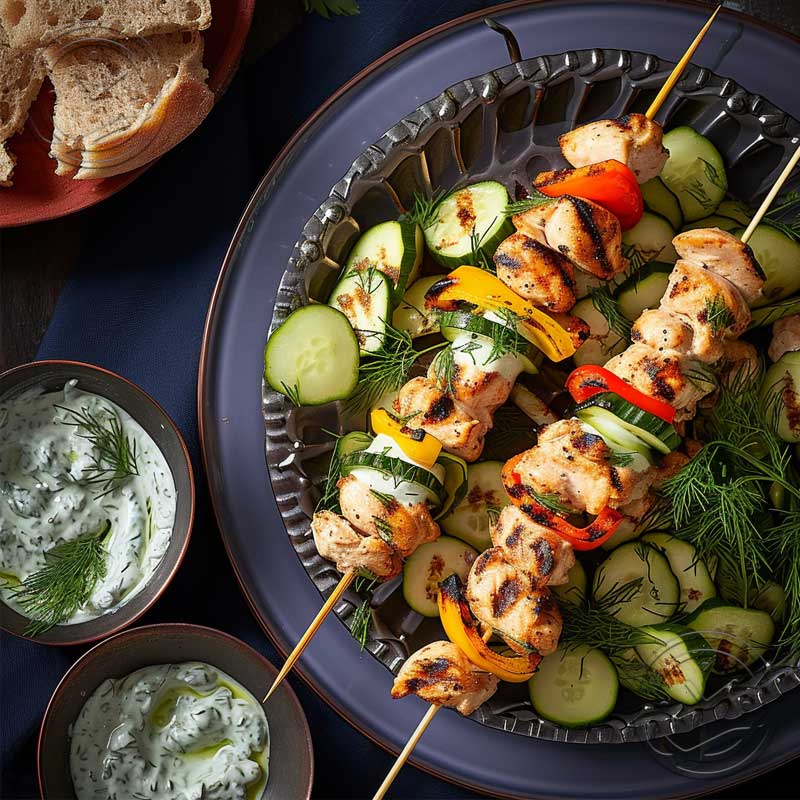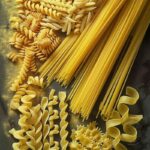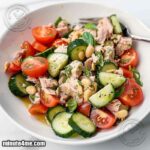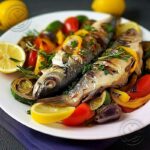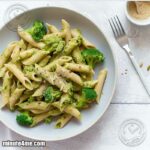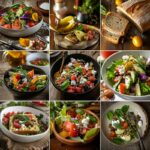Introduction
Poultry plays a pivotal role in the Mediterranean diet, a culinary tradition that has gained global acclaim for its health benefits and rich flavors.
This diet is characterized by:
- High consumption of vegetables, fruits, and whole grains
- Moderate to high consumption of fish and poultry
- Low consumption of dairy and red meat
Poultry, particularly chicken, is a preferred source of lean protein in this diet.
It’s valued for its versatility and nutritional profile.
Rich in essential nutrients like protein, B vitamins, and minerals such as zinc and iron, poultry complements the Mediterranean diet’s focus on overall wellness and disease prevention.
The integration of poultry with other staples of this diet, such as olive oil, herbs, spices, garlic, and a bounty of fresh vegetables, creates meals that are not just nourishing but also deeply satisfying.
Mediterranean Diet Poultry: Recipes and Ideas
The Mediterranean diet thrives on diversity, and poultry dishes in this cuisine are a testament to this variety.
Here are some delectable poultry recipes that embody the essence of Mediterranean flavors:
How To Tell If Your Pasta Is Vegan
Discover the world of delicious vegan pasta with our guide! Whether you follow a plant-based diet or have dietary restrictions,…
Greek Lemon Chicken Magic
Greek Lemon Chicken is a classic dish that perfectly encapsulates the bright, vibrant flavors of the Mediterranean.
Here’s how to bring this dish to life:
- Ingredients: Boneless chicken breasts, fresh lemon juice, olive oil, garlic, oregano, salt, and pepper.
- Marinade: Combine lemon juice, olive oil, minced garlic, dried oregano, salt, and pepper. Marinate the chicken for at least an hour.
- Cooking: Grill or roast the chicken until it’s beautifully golden and cooked through.
- Serving suggestion: Serve with a side of Greek salad, featuring tomatoes, cucumbers, olives, onions, and feta cheese.
This dish is not only a delight to the taste buds but also embodies the health benefits of the Mediterranean diet, with its use of olive oil (a healthy fat) and lemon (rich in vitamin C).
Crafting Italian Chicken Cacciatore
Italian Chicken Cacciatore is a hearty, rustic dish that combines poultry with rich tomato sauce and vegetables.
The process involves:
- Ingredients: Chicken pieces, tomatoes, bell peppers, onions, garlic, olives, capers, herbs, and olive oil.
- Preparation: Begin by sautéing garlic and onions in olive oil, then add the chicken pieces to brown. Incorporate tomatoes, sliced bell peppers, olives, capers, and herbs like rosemary or basil.
- Simmering: Let the dish simmer until the chicken is tender and the sauce thickens.
- Serving: It’s best served with whole-grain pasta or crusty bread, making it a balanced Mediterranean meal.
This dish not only offers a protein-rich meal but also includes a variety of vegetables, making it rich in vitamins, minerals, and fiber.
Step into the vibrant world of the Mediterranean diet and tuna, where health meets indulgence in a symphony of flavors. Tuna,…
Spanish Chicken Paella Secrets
Spanish Chicken Paella is a celebrated dish known for its bold flavors and colorful presentation.
The key to an authentic Paella includes:
- Ingredients: Chicken pieces, saffron, chorizo, rice, chicken broth, garlic, onions, and a variety of Mediterranean vegetables like tomatoes and bell peppers.
- Cooking technique: Cook the chicken with onions and garlic, then add rice, saffron, and broth. Arrange the chicken and chorizo over the rice and let it cook until the rice is tender.
- Vegetables: Add peas, bell peppers, and tomatoes towards the end of cooking.
- Serving: Serve directly from the paella pan, garnished with lemon wedges and parsley.
Paella is not just a dish; it’s a celebration of Mediterranean cuisine, bringing together high-quality protein, complex carbohydrates, and a plethora of vegetables in one pan.
Healthy Cooking Methods
The Mediterranean diet is as much about the method of cooking as it is about the ingredients.
When it comes to poultry, this diet emphasizes cooking techniques that enhance flavor while preserving nutritional value:
- Grilling: Ideal for chicken breasts and kebabs, grilling imparts a smoky flavor and keeps the meat tender and juicy.
- Baking or Roasting: This method is perfect for whole chickens or larger cuts. Seasoned with herbs and spices, and perhaps stuffed with vegetables, a baked or roasted chicken is a centerpiece in Mediterranean cuisine.
- Slow Cooking: Slow-cooked chicken stews or casseroles allow the flavors to meld together beautifully, creating tender and heartwarming dishes.
These methods not only result in delicious meals but also align with the health principles of the Mediterranean diet by reducing the need for excess oil or fat.
Can Tortilla Chips Fit into Your Mediterranean Diet?
Can tortilla chips, a fan favorite for their crispy texture and salty bite, fit into this picture of health and…
Marinades
Marinades are a cornerstone in Mediterranean poultry recipes, serving two purposes – tenderizing the meat and infusing it with robust flavors.
Key components of a Mediterranean marinade include:
- Olive Oil: A healthy fat that’s central to the Mediterranean diet.
- Citrus Juices: Like lemon or orange, adding brightness and aiding in tenderizing the meat.
- Herbs and Spices: Oregano, thyme, rosemary, and garlic are staple herbs that enhance flavor.
A good marinade not only elevates the taste but also contributes to a healthier cooking process by reducing the need for added fats during cooking.
Pairing Poultry with Mediterranean Sides
The Mediterranean diet is renowned for its emphasis on plant-based foods.
When serving poultry, it is traditionally accompanied by a variety of side dishes that are both flavorful and nutritious:
- Roasted Vegetables: Such as zucchini, bell peppers, onions, and eggplants, drizzled with olive oil and seasoned with herbs.
- Whole Grains: Like quinoa, brown rice, or farro, these grains add fiber and nutrients.
- Salads: Greek salad or a simple tomato and cucumber salad, dressed with olive oil and lemon, make refreshing sides.
These sides not only complement the poultry dishes but also ensure a balanced meal with a good mix of proteins, carbohydrates, and essential nutrients.
Portion Control
Portion control is an integral part of the Mediterranean diet, focusing on moderation and balance:
- Poultry Servings: A typical serving size is about 3-4 ounces per meal.
- Balanced Plates: Half the plate filled with vegetables, a quarter with whole grains, and a quarter with poultry.
This approach to portion control ensures a balanced intake of nutrients while avoiding overconsumption.
Nutrition of Poultry
Poultry, as part of the Mediterranean diet, offers several nutritional benefits:
- High-Quality Protein: Essential for muscle repair and growth.
- Low in Saturated Fat: Especially when skinless, making it a healthier choice.
- Rich in B Vitamins: Important for energy metabolism and brain health.
Including poultry in the diet contributes to a balanced intake of essential nutrients, supporting overall health and wellness.
Flavors and Spices
The use of herbs and spices is fundamental in Mediterranean cuisine, not just for flavor but also for their health benefits:
- Garlic: Known for its cardiovascular health benefits.
- Rosemary and Thyme: Both have antioxidant properties.
- Paprika and Saffron: Add depth and warmth to dishes.
These natural flavor enhancers contribute to the overall healthfulness of the Mediterranean diet, reducing the need for salt and artificial flavorings.
Conclusion
Poultry, when cooked with the rich flavors and healthy techniques of the Mediterranean diet, can be both a gastronomic delight and a nutritional boon.
Whether it’s the zesty Greek Lemon Chicken, the hearty Chicken Cacciatore, or the flavorful Chicken Paella, these dishes showcase how poultry can be creatively and healthfully incorporated into your daily meals.
Embrace these recipes and cooking methods, and you’ll find that poultry is not just a food item, but a key player in your journey towards a healthier lifestyle.
